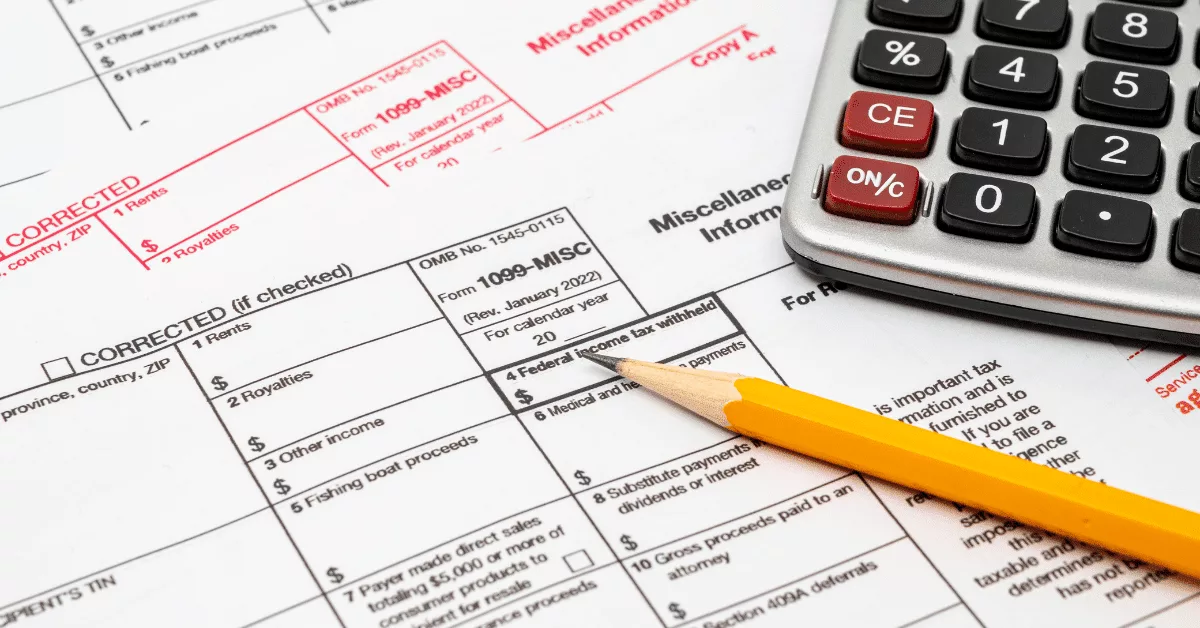
The 1099 form stands as a crucial document in the realm of U.S. tax reporting, playing a pivotal role in ensuring financial transparency between payers and recipients of various income streams.
As taxpayers navigate the intricate landscape of financial documentation, understanding the nature and purpose of the 1099 form becomes paramount.
This introductory exploration seeks to shed light on the essence of the 1099 form, delving into its origins, its diverse manifestations such as the 1099-MISC and 1099-INT, and ultimately, its overarching purpose in the larger context of tax compliance.
Unraveling the intricacies of the 1099 form proves essential for individuals and businesses alike, as it directly influences the accuracy of income reporting and carries significant implications for both the issuers and recipients of this critical financial document.
What Is A 1099 Form, And What Is Its Purpose?
A 1099 form is a crucial piece of financial documentation used in the United States for reporting various types of income. Its purpose is to provide a detailed record of income earned by individuals or entities beyond traditional salary or wages. The form serves as a means to report income that may not be subject to standard withholding, such as freelance earnings, interest, dividends, or other miscellaneous sources.
The 1099 form comes in different variants, each designated for specific types of income. For example, the 1099-MISC is employed for reporting miscellaneous income, while the 1099-INT is utilized for interest income. Businesses and entities responsible for making payments to individuals or service providers are required to issue these forms to both the Internal Revenue Service (IRS) and the recipients of the income.
The primary purpose of the 1099 form is to ensure accurate and transparent reporting of income, aiding both the taxpayer and the IRS in the tax-filing process. It plays a crucial role in maintaining tax compliance, allowing the government to track various sources of income and ensuring that all applicable taxes are paid. Understanding the nuances of the 1099 form is essential for individuals and businesses to fulfill their tax obligations and avoid potential penalties associated with non-compliance.
Types Of 1099 Forms
1099-MISC
The 1099-MISC form is a critical document in the United States tax system used to report miscellaneous income earned by individuals or businesses throughout the tax year. “Miscellaneous Income” encompasses various types of payments that don’t fit into the conventional employee-employer relationship, and therefore, aren’t subject to regular payroll withholding. Key points about the 1099-MISC form include:
- When is it used?: The 1099-MISC form is typically used by businesses, employers, or entities that make payments to freelancers, independent contractors, or other non-employees. It is issued for payments totaling $600 or more in a tax year for services provided, rent, prizes, awards, or other types of miscellaneous income.
- Examples of Income Reported on 1099-MISC: Payments made to independent contractors or freelancers for services rendered. Payments made to individuals or entities for rental of property. Monetary awards or prizes not associated with employment.
- Filing and Distribution: Businesses or entities that make these payments are responsible for issuing the 1099-MISC forms to both the IRS and the recipient. Recipients should receive their copies of the form by January 31st, and the IRS must receive the filing by the end of February if filing on paper or by the end of March if filing electronically.
- Tax Implications: Individuals or businesses receiving a 1099-MISC are considered self-employed and are responsible for reporting this income on their tax returns. Since taxes are not withheld at the time of payment, recipients may need to make estimated tax payments throughout the year to cover their tax liability.
Understanding the 1099-MISC form is crucial for both payers and recipients, ensuring accurate income reporting and compliance with tax regulations.
1099-INT
The 1099-INT form is a critical component of the U.S. tax system, specifically designed for reporting interest income earned during a tax year. Issued by banks, financial institutions, or other entities that pay interest, the form is essential for both taxpayers and the Internal Revenue Service (IRS) to ensure accurate income reporting. Here are key points about the 1099-INT form:
- When is it used?: The 1099-INT form is used to report interest income paid by banks, credit unions, or other financial institutions to individuals or businesses. It is typically issued when the interest earned is $10 or more in a given tax year.
- Types of Interest Income Reported: Interest earned on savings accounts, checking accounts, or certificates of deposit. Interest received from personal loans or mortgages. Interest earned on U.S. Treasury bonds or savings bonds.
- Filing and Distribution: Entities responsible for paying interest are required to issue the 1099-INT form to both the IRS and the recipient by January 31st. Recipients must include this information when filing their income tax returns, ensuring accurate reporting of all interest income.
- Tax Implications: Individuals or businesses receiving a 1099-INT must report the interest income on their tax returns. This form is crucial for taxpayers to declare all sources of income and for the IRS to verify that individuals are meeting their tax obligations.
Understanding the 1099-INT form is essential for those earning interest income and ensures compliance with tax regulations, promoting transparency in financial transactions.
Issuing And Receiving 1099 Forms
Entities Responsible For Issuing 1099 Forms
The responsibility for issuing 1099 forms falls on various entities that make certain types of payments to individuals or businesses. These entities are required to report specific types of income to both the recipient and the Internal Revenue Service (IRS). Here are the primary entities responsible for issuing 1099 forms:
- Employers and Businesses: If you hire an independent contractor or freelancer and pay them $600 or more for services during the tax year, you are required to issue a 1099-MISC form. Companies making payments for rent, services, prizes, awards, or other miscellaneous income must issue the appropriate 1099 forms.
- Financial Institutions: Financial institutions are responsible for issuing 1099-INT forms to individuals or businesses who earned $10 or more in interest on accounts. Lenders providing mortgage interest statements to borrowers report the information on a 1098 form.
- Investment Firms: Investment firms issue 1099 forms to report various types of investment income, such as dividends and capital gains, to investors. Mutual fund companies provide 1099 forms to investors reporting dividends and capital gains.
- Pension Plans and Retirement Accounts: Institutions holding Individual Retirement Accounts (IRAs) issue 1099-R forms to report distributions from retirement accounts. Companies issuing pensions or other retirement plan distributions provide 1099-R forms to recipients.
- Real Estate Brokers: Brokers who facilitated the sale of real estate report the proceeds on a 1099-S form.
Entities responsible for issuing 1099 forms must provide copies to both the IRS and the individuals or businesses receiving the income by specific deadlines. Compliance with these reporting requirements ensures transparency and accuracy in income reporting for tax purposes.
Obligations For Individuals And Businesses Receiving 1099 Forms
Individuals and businesses receiving 1099 forms have specific obligations to fulfill to ensure accurate tax reporting and compliance with IRS regulations. Here are the key obligations for those who receive 1099 forms:
- Reporting Income: Recipients must report all income received via 1099 forms on their federal income tax returns. This includes income from 1099-MISC, 1099-INT, or any other relevant 1099 form. Businesses receiving 1099 forms must accurately report the income on their business tax returns. This includes reporting miscellaneous income, interest income, or other applicable categories.
- Record-Keeping: Maintain accurate records of all income received through 1099 forms. This includes keeping copies of the forms for reference and documentation. Keep detailed records of all 1099 forms received, as these documents are crucial for preparing financial statements and tax returns.
- Estimated Tax Payments: Since taxes are not typically withheld from income reported on 1099 forms, recipients may be required to make estimated tax payments throughout the year to cover their tax liability. Depending on the structure and nature of the business, estimated tax payments may be necessary to cover income reported on 1099 forms.
- Reviewing and Correcting Errors: It is essential to review the information on the 1099 forms for accuracy. If any errors are identified, recipients should contact the issuer promptly to request corrections.
- Compliance with Filing Deadlines: Ensure timely filing of personal income tax returns, incorporating the information from 1099 forms. Adhere to filing deadlines for business tax returns, incorporating accurate data from all 1099 forms received.
- Communication with Issuers: Maintain open communication with entities issuing the 1099 forms. If there are discrepancies or questions regarding the information provided, seek clarification promptly.
Fulfilling these obligations is crucial for individuals and businesses to meet their tax responsibilities, avoid penalties, and contribute to the overall accuracy and transparency of the tax system. It’s advisable to consult with tax professionals if there are uncertainties or complexities in the tax reporting process.
Importance And Impact Of 1099 Forms
Role Of 1099 Forms In Tax Reporting
The role of 1099 forms in tax reporting is fundamental to the accuracy, transparency, and fairness of the U.S. tax system. These forms play several crucial roles in the overall tax reporting process:
- Comprehensive Income Reporting: 1099 forms capture income beyond traditional salary or wages. They encompass various income streams such as freelance earnings, interest, dividends, and other miscellaneous sources. This comprehensive reporting ensures that all sources of income are considered in the tax calculation.
- Facilitating Taxpayer Compliance: By receiving 1099 forms, taxpayers are provided with a clear record of income earned from different sources. This documentation helps individuals and businesses fulfill their tax obligations by accurately reporting all taxable income on their tax returns.
- Supporting IRS Oversight: The IRS relies on 1099 forms to cross-verify the income reported by taxpayers. These forms act as a critical tool for the IRS to ensure that individuals and businesses are complying with tax laws, reducing the likelihood of underreporting or tax evasion.
- Monitoring Taxpayer Activities: 1099 forms contribute to the IRS’s ability to monitor various economic activities. For example, 1099-MISC forms provide insights into the gig economy and self-employment trends, while 1099-INT forms help track interest income across financial institutions.
- Calculation of Tax Liability: The information provided on 1099 forms directly influences the calculation of tax liability. Recipients of 1099 forms must include the reported income when completing their tax returns, impacting the total tax amount owed or refunded.
- Enhancing Accuracy and Transparency: The use of 1099 forms promotes accuracy in income reporting and enhances the transparency of financial transactions. This transparency is essential for maintaining public trust in the tax system and ensuring a fair distribution of the tax burden.
- Enabling Tax Deductions and Credits: Taxpayers can use information from 1099 forms to claim deductions and credits for which they may be eligible. For instance, interest reported on a 1099-INT may be deductible, and certain business expenses reported on a 1099-MISC can impact a taxpayer’s taxable income.
Overall, the role of 1099 forms in tax reporting is multifaceted. These forms serve as a critical link between payers, recipients, and the IRS, facilitating accurate income reporting, ensuring compliance with tax regulations, and contributing to the overall integrity of the tax system.
Compliance And Consequences
Ensuring compliance with 1099 reporting requirements is paramount for both entities issuing the forms and those receiving them. Payers, whether businesses or individuals, must meticulously adhere to IRS regulations, accurately completing forms, providing timely copies to both recipients and the IRS, and maintaining precise records. Failure to meet these obligations can result in penalties, with the severity contingent on the lateness of the filing and the type of violation. Deliberate negligence or willful disregard for filing requirements can incur more substantial penalties.
Recipients of 1099 forms bear a parallel responsibility to accurately report income on their tax returns. Late filing or underreporting can lead to penalties and interest charges based on the amount owed and the timing of the reporting lapse. Both payers and recipients may face interest charges for late payment or underpayment of taxes. Additionally, non-compliance may invite IRS audits, which can be time-consuming and may result in further penalties and interest if discrepancies are uncovered.
Importantly, inaccurate reporting or the failure to report income correctly can have cascading effects, leading to the loss of eligible deductions and credits, ultimately increasing the tax liability for individuals or businesses. Given these potential consequences, a proactive approach to understanding and fulfilling 1099 reporting obligations is essential, possibly involving professional guidance to navigate the intricacies of tax regulations successfully.
Conclusion
Overall, the 1099 forms play a pivotal role in the intricate tapestry of the U.S. tax system, serving as a linchpin for accurate and transparent income reporting. It is evident that compliance with 1099 reporting requirements is not merely a procedural formality; rather, it carries substantial consequences for both the entities responsible for issuing these forms and the individuals or businesses receiving them.
For payers, meticulous adherence to IRS regulations is imperative to avoid penalties and maintain the integrity of financial transactions. Equally, recipients bear the responsibility of timely and accurately reporting income to prevent penalties, interest charges, and potential loss of deductions or credits. The repercussions of non-compliance extend beyond mere financial penalties, encompassing the prospect of IRS audits, which can be a time-consuming and stressful process.
As we navigate the complexities of the tax landscape, it becomes evident that understanding and fulfilling 1099 reporting obligations are not just legal requirements but essential components of a fair and equitable tax system. Proactive engagement, coupled with professional guidance when needed, ensures that the tax reporting process remains transparent, trustworthy, and aligned with the principles of financial responsibility. In embracing these obligations conscientiously, both payers and recipients contribute to the overall efficacy and credibility of the U.S. tax framework.




